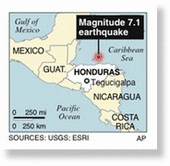
© USGS; ESRI
Tegucigalpa - A powerful earthquake toppled more than two dozen homes in Honduras and Belize early Thursday, killing two children and injuring 40 people as terrified residents spilled from their homes across much of Central America.
The magnitude-7.1 quake struck at 2:24 a.m. (4:24 a.m. EDT; 0824 GMT) off the Caribbean coast of Honduras, 80 miles (130 kilometers) northeast of the beach town of La Ceiba, according to the U.S. Geological Survey in Golden, Colorado.
"People were running for the door," Alfredo Cedeno said from the reception desk at the Gran Hotel Paris in La Ceiba. "You could really feel it and you could see it - the water came out of the pool."
Reynaldo Funez, 15, was buried in his house in Pineda de la Lima, 120 miles (200 kilometers) north of the capital, Tegucigalpa, and 6-year-old Deily Yazmin Santos was killed when her house collapsed in the beach town of Morazan, national fire commander Col. Carlos Cordero said.
He said there were unconfirmed reports of two more deaths. In all, he said, at least 40 people were injured, most along the Caribbean coast.
"It was an earthquake of great proportions," said Ana Maria Rivera, spokeswoman for the Honduran emergency commission.
Democracy Bridge, which spans the country's largest river, the Ulua, collapsed in the town of El Progreso, Cordero said. The bridge is one of two connecting the northern city of San Pedro Sula, Honduras' second-largest, with the rest of the country. Officials were evaluating the second bridge to make sure it was safe.
"The central part of the bridge fell into the river," Cordero said.
San Pedro Sula is scheduled to host a summit of foreign ministers of the Organization of American States next week. There was no immediate indication that the event would be affected.
In all, at least 24 houses collapsed along Honduras' Caribbean coast, according to Carlos Gonzalez, deputy director of the Permanent Emergency Commission.
At least five wooden houses on stilts collapsed in three Belizean coastal towns, while Belize City residents ran into the street as glasses and framed pictures crashed off of shelves. A water tower toppled in the town of Independence and electricity was out all the way to the Mexican border, local officials said.
"I urge you not to panic, but to remain calm," National Emergency Minister Melvin Hulse said on the radio. "Your government is monitoring the situation and will be keeping you informed."
Raul Coto, a 68-year-old agronomist, said several dozen people fled the hotel where he was staying in Independence.
"I thought the second floor was going to collapse," he said. "It was shaking hard."
Tegucigalpa Mayor Ricardo Alvarez appealed for calm as well as officials reported electricity, telephones and Internet connections were cut across a large part of Honduras. Education Minister Marlon Breve closed schools along the coast and in the Bay Islands.
Closest to the epicenter were the idyllic islands of Roatan and Utila, where officials and hotel employees said there were no injuries or major damage. A tsunami watch was canceled for Honduras, Belize and Guatemala when no unusual waves appeared.
Raul Gonzalez, a receptionist at the Gran Hotel Sula in San Pedro Sula, said guests ran into the streets in their pajamas.
"I ran out of the building and kept going for about a block before I looked back and everything had calmed," he said. "It was really strong. I have never felt anything like that."
The hotel did not suffer major damage.
A two-story warehouse caught fire in San Pedro Sula but no injuries were reported, firefighter Lt. Col. Daniel Flores told HRN radio.
The quake was felt strongly in El Salvador, Guatemala and northern Nicaragua, but firefighter Byron Juarez said a survey of firefighting offices throughout Guatemala revealed no reports of major damage. No damage was reported in El Salvador or Nicaragua.
The quake was relatively shallow, with a depth of only 6 miles (10 kilometers), increasing its potential to cause major damage, said Don Blakeman, a U.S. Geological Survey expert.
"It is still possible we may find out there was more damage, but I think the fact that this earthquake was a bit off shore has helped tremendously," he said. "Obviously the further away from the epicenter you get, there is less damage."
Blakeman said people in Mexico and on several Caribbean islands also reported feeling the earthquake.
The USGS said a magnitude-4.8 aftershock struck off Honduras about three hours after the quake.
Reader Comments
to our Newsletter